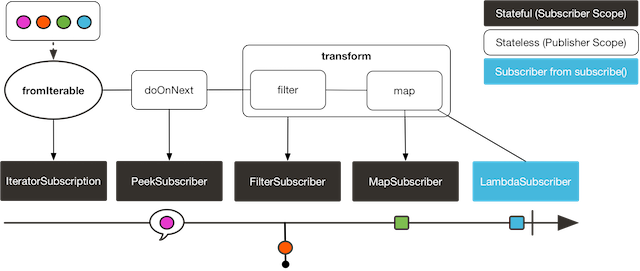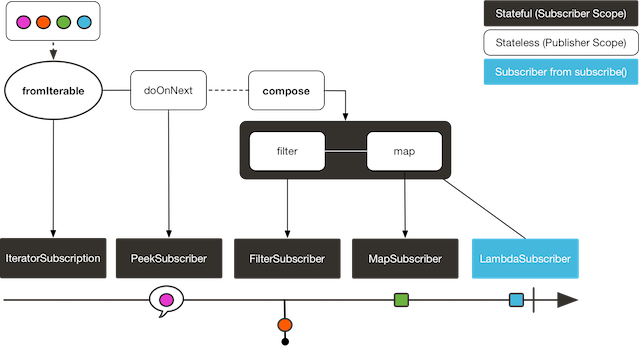Mutualizing Operator Usage
From a clean-code perspective, code reuse is generally a good thing. Reactor offers a few patterns that can help you reuse and mutualize code, notably for operators or combinations of operators that you might want to apply regularly in your codebase. If you think of a chain of operators as a recipe, you can create a “cookbook” of operator recipes.
1. Using the transform Operator
The transform operator lets you encapsulate a piece of an operator chain into a
function. That function is applied to an original operator chain at assembly time to
augment it with the encapsulated operators. Doing so applies the same operations to all
the subscribers of a sequence and is basically equivalent to chaining the operators
directly. The following code shows an example:
Function<Flux<String>, Flux<String>> filterAndMap =
f -> f.filter(color -> !color.equals("orange"))
.map(String::toUpperCase);
Flux.fromIterable(Arrays.asList("blue", "green", "orange", "purple"))
.doOnNext(System.out::println)
.transform(filterAndMap)
.subscribe(d -> System.out.println("Subscriber to Transformed MapAndFilter: "+d));The following image shows how the transform operator encapsulates flows:

The preceding example produces the following output:
blue
Subscriber to Transformed MapAndFilter: BLUE
green
Subscriber to Transformed MapAndFilter: GREEN
orange
purple
Subscriber to Transformed MapAndFilter: PURPLE2. Using the transformDeferred Operator
The transformDeferred operator is similar to transform and also lets you encapsulate operators
in a function. The major difference is that this function is applied to the original
sequence on a per-subscriber basis. It means that the function can actually produce a
different operator chain for each subscription (by maintaining some state). The
following code shows an example:
AtomicInteger ai = new AtomicInteger();
Function<Flux<String>, Flux<String>> filterAndMap = f -> {
if (ai.incrementAndGet() == 1) {
return f.filter(color -> !color.equals("orange"))
.map(String::toUpperCase);
}
return f.filter(color -> !color.equals("purple"))
.map(String::toUpperCase);
};
Flux<String> composedFlux =
Flux.fromIterable(Arrays.asList("blue", "green", "orange", "purple"))
.doOnNext(System.out::println)
.transformDeferred(filterAndMap);
composedFlux.subscribe(d -> System.out.println("Subscriber 1 to Composed MapAndFilter :"+d));
composedFlux.subscribe(d -> System.out.println("Subscriber 2 to Composed MapAndFilter: "+d));The following image shows how the transformDeferred operator works with per-subscriber transformations:

The preceding example produces the following output:
blue
Subscriber 1 to Composed MapAndFilter :BLUE
green
Subscriber 1 to Composed MapAndFilter :GREEN
orange
purple
Subscriber 1 to Composed MapAndFilter :PURPLE
blue
Subscriber 2 to Composed MapAndFilter: BLUE
green
Subscriber 2 to Composed MapAndFilter: GREEN
orange
Subscriber 2 to Composed MapAndFilter: ORANGE
purple
